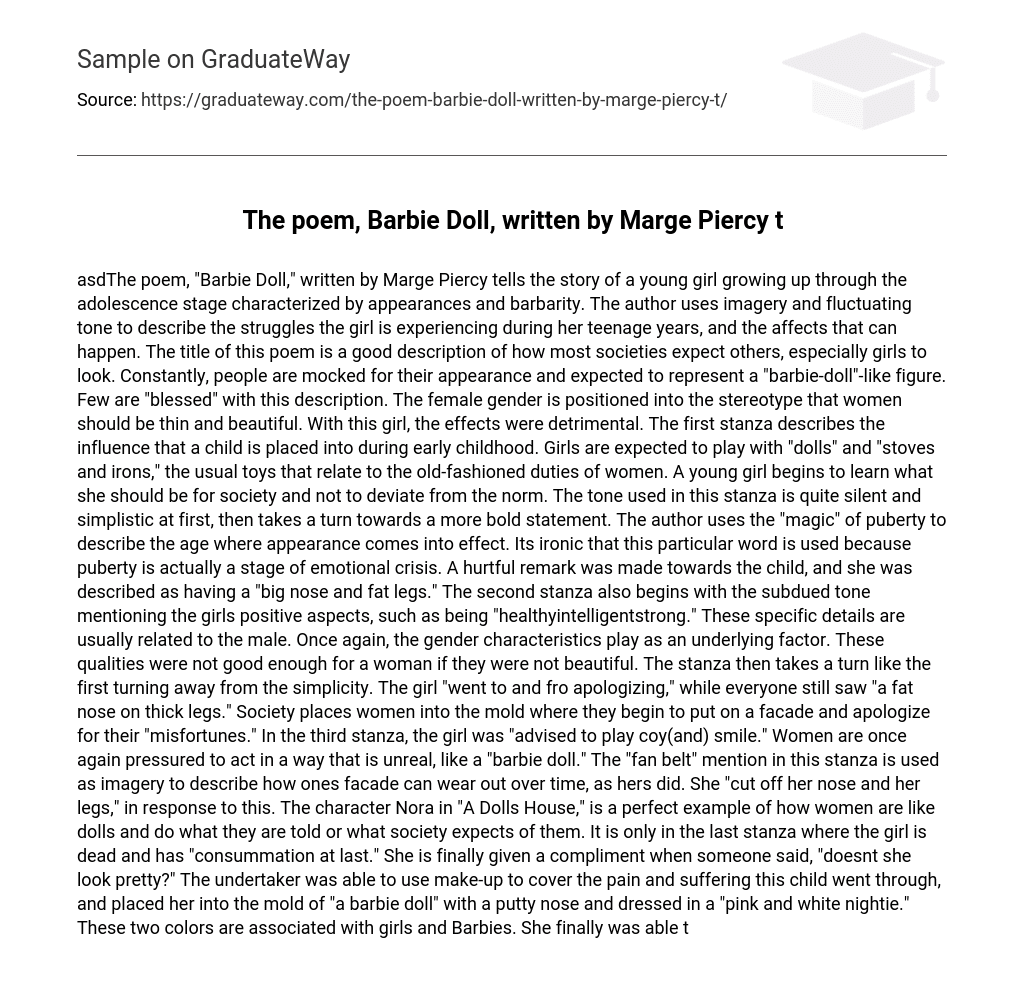asdThe poem, “Barbie Doll,” written by Marge Piercy tells the story of a young girl growing up through the adolescence stage characterized by appearances and barbarity. The author uses imagery and fluctuating tone to describe the struggles the girl is experiencing during her teenage years, and the affects that can happen. The title of this poem is a good description of how most societies expect others, especially girls to look. Constantly, people are mocked for their appearance and expected to represent a “barbie-doll”-like figure. Few are “blessed” with this description. The female gender is positioned into the stereotype that women should be thin and beautiful. With this girl, the effects were detrimental. The first stanza describes the influence that a child is placed into during early childhood. Girls are expected to play with “dolls” and “stoves and irons,” the usual toys that relate to the old-fashioned duties of women. A young girl begins to learn what she should be for society and not to deviate from the norm. The tone used in this stanza is quite silent and simplistic at first, then takes a turn towards a more bold statement. The author uses the “magic” of puberty to describe the age where appearance comes into effect. Its ironic that this particular word is used because puberty is actually a stage of emotional crisis. A hurtful remark was made towards the child, and she was described as having a “big nose and fat legs.” The second stanza also begins with the subdued tone mentioning the girls positive aspects, such as being “healthyintelligentstrong.” These specific details are usually related to the male. Once again, the gender characteristics play as an underlying factor. These qualities were not good enough for a woman if they were not beautiful. The stanza then takes a turn like the first turning away from the simplicity. The girl “went to and fro apologizing,” while everyone still saw “a fat nose on thick legs.” Society places women into the mold where they begin to put on a facade and apologize for their “misfortunes.” In the third stanza, the girl was “advised to play coy(and) smile.” Women are once again pressured to act in a way that is unreal, like a “barbie doll.” The “fan belt” mention in this stanza is used as imagery to describe how ones facade can wear out over time, as hers did. She “cut off her nose and her legs,” in response to this. The character Nora in “A Dolls House,” is a perfect example of how women are like dolls and do what they are told or what society expects of them. It is only in the last stanza where the girl is dead and has “consummation at last.” She is finally given a compliment when someone said, “doesnt she look pretty?” The undertaker was able to use make-up to cover the pain and suffering this child went through, and placed her into the mold of “a barbie doll” with a putty nose and dressed in a “pink and white nightie.” These two colors are associated with girls and Barbies. She finally was able to fit into the girl camouflage. Through the teenage years, beauty seems to be a determinant for popularity and some success, which is important to young girls during middle school and high school. At an early age, remarks made about ones appearances can damage an adolescents personality and self-esteem. In this particular case, it was deathly for this child, as it is for some. The author was able to accomplish this theme through her tone and imagery, while using colors and items associated with girls. The societies within America usually describe someone as beautiful if they are thin and have the perfect body, such as a barbie doll in this poem.
Bibliography:





